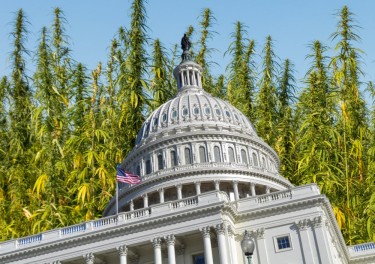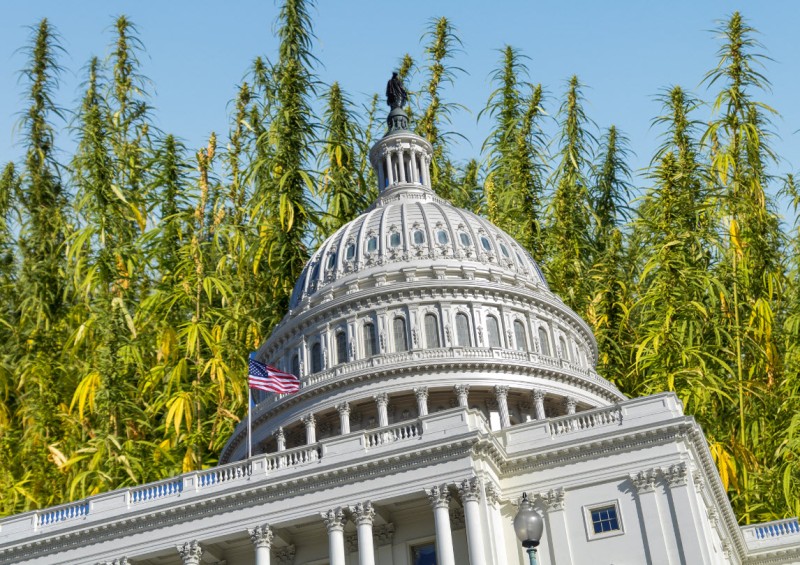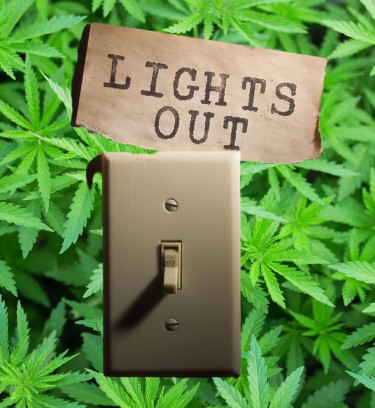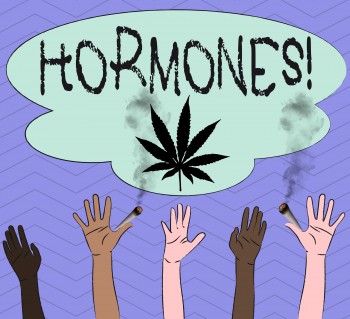
Why Does the U.S. Government Hate Freedom?
This is the question I find myself asking as I witness representatives in Congress raging about "closing the loophole" when it comes to legal hemp-derived psychoactive cannabinoids like Delta-8 THC, THCa, and others. It seems that our elected officials are more interested in restricting personal liberties than embracing the potential benefits of a thriving industry.
For the past six years, the United States has experienced a form of national cannabis legalization, though most people were unaware of it.
Thanks to the 2018 Farm Bill, hemp-derived psychoactive cannabinoids have allowed virtually every state to have some sort of legal cannabis products available in stores. This has been a game-changer for consumers and entrepreneurs alike.
However, now Congress aims to kill this $28 billion per year industry, rather than acknowledging that cannabis legalization, despite limited regulation, did not bring about the end of the world. In fact, it has created jobs, generated tax revenue, and provided countless individuals with access to alternative wellness options.
In this article, we will explore why the U.S. government seems to hate freedom and innovation, and why it's crucial that you begin to vote out these dinosaurs who are holding us back.
The majority of Americans want legal access to cannabis, but the government remains woefully out of touch with the will of the people.
The Unregulated Cannabis Market
When most people think of the "unregulated cannabis market," they often picture the illicit, black market trade. However, they would be mistaken. In reality, the hemp-derived cannabis marketplace has been the one operating largely unregulated for the past six years, much to the chagrin of the FDA and the U.S. government.
This unregulated market has flourished, growing into a staggering $28 billion per year industry. Hemp-derived psychoactive cannabinoids, such as Delta-8 THC and THCa, have become widely available, with products frequently found in head shops across the United States and even in neighboring countries like Mexico.
Essentially, this unregulated cannabis market has thrived without significant government intervention. Entrepreneurs have seized the opportunity created by the 2018 Farm Bill to innovate and meet consumer demand, all while operating in a legal gray area.
However, this booming industry is now seen as a threat by both legal cannabis companies operating within state-regulated systems and the government itself. Legal cannabis businesses argue that the unregulated hemp-derived market is cutting into their profit margins, as consumers opt for more readily available and often cheaper alternatives.
Meanwhile, government officials, likely influenced by lobbyists from the regulated cannabis industry, are seeking to put an end to this unregulated market. They claim concerns over safety and the lack of oversight, but it's hard to ignore the financial motivations at play.
This brings us to the current situation, where a bill is floating through Congress that could severely restrict these hemp-derived cannabinoids and essentially wipe out an entire industry overnight. If passed, this legislation would redefine the legal status of these compounds, making them illegal under federal law.
The potential ramifications of this bill are immense. It would not only destroy a multibillion-dollar industry and eliminate countless jobs but also deprive consumers of access to products they have come to rely on. It's a stark reminder of how quickly the government can intervene and disrupt entire markets, especially when powerful interests are at stake.
As we continue to examine this issue, it's essential to consider the broader implications of the government's actions. Is this really about public safety, or is it a blatant attempt to protect the profits of a select few at the expense of consumer choice and free-market innovation? The answer to that question may determine the future of the hemp-derived cannabinoid industry and the wider fight for cannabis legalization in the United States.
How to make hemp derived psychoactive THC
How to Make Psychoactive Hemp THC
To understand the current controversy surrounding hemp-derived psychoactive cannabinoids, it's essential to grasp the differences between typical cannabis and hemp-derived THC products.
Traditional cannabis, often referred to as marijuana, contains a high concentration of delta-9-THC, the primary psychoactive compound responsible for the "high" associated with cannabis use. Hemp, on the other hand, is legally defined as cannabis plants containing less than 0.3% delta-9-THC by dry weight.
However, hemp plants still contain other cannabinoids, such as CBD, delta-8-THC, and THCa, which can be extracted and processed to create psychoactive products. The process of obtaining these compounds isn't always naturally derived; it often requires additional steps and specific chemical processes.
For example, delta-8-THC is typically synthesized from CBD through a chemical reaction involving solvents and acids. This process alters the molecular structure of CBD, converting it into delta-8-THC, an isomer of delta-9-THC with similar psychoactive properties.
Despite the differences in production methods, the chemical structures of hemp-derived THC compounds are nearly identical to those found in traditional cannabis.
This means that the effects experienced by users are quite similar, although some cannabis enthusiasts argue that delta-8-THC produces a milder, more clear-headed high compared to delta-9-THC.
Nonetheless, the emergence of hemp-derived psychoactive products has provided a glimpse into what true cannabis legalization could look like. These products have been widely available, offering consumers a legal alternative to marijuana in states where recreational use remains prohibited.
The success of the hemp-derived THC market demonstrates that people are ready for a more open and accessible approach to cannabis. It has shown that legalization doesn't necessarily lead to the doomsday scenarios often portrayed by opponents, such as increased crime rates or widespread addiction.
Instead, the unregulated hemp-derived THC industry has highlighted the potential benefits of a free and open cannabis market, including job creation, economic growth, and the availability of alternative wellness options for consumers.
As the government seeks to clamp down on this industry, it's crucial to recognize that the genie is already out of the bottle. Consumers have experienced the benefits of legal access to psychoactive cannabinoids, and they are unlikely to accept a return to the days of strict prohibition.
Rather than attempting to suppress this market, policymakers should focus on creating sensible regulations that prioritize consumer safety, product quality, and responsible use. This approach would not only protect public health but also foster innovation and economic opportunity within the cannabis sector.
The rise of hemp-derived psychoactive cannabinoids has provided a tantalizing preview of what true cannabis legalization could achieve.
As the debate over the future of this industry continues, it's essential to keep sight of the bigger picture: the need for a rational, evidence-based approach to cannabis policy that respects individual freedom and promotes the well-being of society as a whole.
The Sticky Bottom Line
The rise of the hemp-derived psychoactive cannabinoid industry has provided us with a unique opportunity to witness the effects of cannabis legalization in action. Over the past six years, this unregulated market has thrived, offering consumers access to legal, psychoactive cannabis products and demonstrating the potential benefits of a more open approach to cannabis policy.
Despite the lack of strict regulations, the sky hasn't fallen. Society hasn't crumbled under the weight of widespread cannabis use. Instead, we've seen the emergence of a vibrant, multibillion-dollar industry that has created jobs, generated tax revenue, and provided people with alternative options for relaxation and wellness.
This experience should serve as a wake-up call to policymakers and the public alike. It's time to acknowledge that the current system of cannabis prohibition is broken and that a new approach is needed. The solution is clear: we must completely deschedule cannabis at the federal level and allow states to establish their own regulatory frameworks.
By removing cannabis from the list of controlled substances, we can finally begin to treat it like any other commodity. This will open the door to a new era of innovation, entrepreneurship, and economic growth, as businesses and investors flock to the cannabis sector.
Moreover, descheduling cannabis will enable us to embrace new market norms and adapt to the changing preferences of consumers. As the hemp-derived THC market has shown, Americans are ready and willing to incorporate cannabis into their daily lives, just as they do with alcohol or tobacco.
In fact, recent studies have indicated that Americans now consume cannabis on a daily basis more frequently than they drink alcohol. This shift in behavior reflects a growing acceptance of cannabis as a normal part of adult life, and it's time for our laws and policies to catch up with this reality.
The bottom line is that cannabis is here to stay, and it's up to us to decide how we want to approach it as a society.
We can either continue down the path of prohibition, wasting resources on enforcement and criminalization, or we can embrace the opportunities presented by legalization.
By choosing the latter, we can create a safer, more equitable, and more prosperous future for all. We can establish a well-regulated cannabis market that prioritizes public health, social justice, and economic growth, while also respecting the individual rights and freedoms of consumers.
The hemp-derived psychoactive cannabinoid industry has given us a glimpse of what this future could look like. Now, it's up to us to make it a reality. It's time to deschedule cannabis, embrace new market norms, and welcome the cannabis revolution with open arms.







